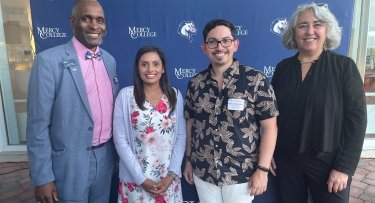
From left to right: Mercy College Vice President of Bronx and Manhattan Campuses Scorpio Rogers, Ph.D., Mercy College Assistant Professor of Mental Health Counseling Melissa Ramdas, Ph.D., Mercy College Assistant Professor of Biology Patricio Mujica-Urzúa, Ph.D., Mercy College Provost and Vice President of Academic Affairs Eva Fernández.
The Mercy College community gathered on June 1 to commemorate Pride Month 2023 at its Bronx Campus, a celebration of Pride and of Mercy’s longstanding ties to the Bronx community, which President Tim Hall reminded everyone dates to the 1970s. Hall, who is retiring at the end of June, remarked on the support and resources Mercy continues to provide in reaching out to the LGBTQIA+ students, faculty and staff at the College.
“We’re trying to create a diverse and welcoming and inclusive community here at Mercy College,” Hall said. “Both among our students and among the faculty and staff who serve there. We’re trying to both celebrate the rich diversity of our community, and to try to be the kind of place where students, faculty and staff from a variety of backgrounds can write their own stories. We think that writing one’s own story requires a certain kind of welcoming and inclusive community...one which sees [people] for who they are, not for who we might imagine them to be, and tries to understand, respect and regard them.”
This year’s program featured two Mercy College faculty members who are immersed in supporting the needs and concerns of the LGBTQIA+ community.
Assistant Professor of Mental Health Counseling Melissa Ramdas, Ph.D., who does instruction in both Mercy’s School Counseling and Mental Health Counseling Programs and has more than a decade of clinical and academic experience, spoke of her efforts to teach students who will soon, if they are not already, be treating patients themselves.
“We want our students to get to a deeper understanding of the client in front of them. How to ask thoughtful but not intrusive questions. In our skills-based classes we talk about what do you do when you first meet a person, and I have my students practice that and I have them do role plays to look at how are they going to have these conversations, and after these activities we talk about how they feel.”
Ramdas says she has seen changes in her Mercy students – most of whom are adults already serving in clinical roles – over the years.
“They come in a little more prepared, they know some terminology, they ask more thoughtful questions. They understand when I say let’s talk about pronouns, what that means. Our students are adults, so they have experience with the population they will ultimately serve, and because of that awareness, they really come in wanting to learn the skills to support those communities.”
Also on the panel was Patricio Mujica-Urzúa, Ph.D., a vascular cell biologist with 10 years of experience in scientific research and education, who teaches anatomy, physiology and biology at Mercy. Although his subject matter can be very matter of fact, he says “I encourage all my students to be their authentic selves. Role modelling is important. It’s important to create a space that gives them the choice. I have students in the lab, I want to know them. So, it’s my responsibility to generate the space to do that. And that’s a paradigm shift that has been taking place in science over the past 20 years. I want to be open to hearing what they have to say.”
Asked what colleges nationally can do better on behalf of students in their LGBTQIA population, Mujica-Urzúa said, “We have a number of initiatives that are attempting to foster inclusivity. Often, we speak about inclusion in terms of race and ethnicity. But ultimately it has to do with identity. And we can sometimes lose track of the intersections of all these things.”
Ramdas added a sentiment heard often – that Pride should not simply be one month long. “For students to share their pride at any time is something that collectively as colleges we should figure out how to do. It’s a big task, but we should have conversations with students about their direct needs and their specific wants – that can also play a part in how we create change.
Mujica-Urzúa also spoke of the importance of faculty interaction and modeling – for their students but also for themselves. “We need to find more ways to integrate students and faculty – and how we are all part of the same community. We want to have a conversation with our fellow faculty who belong to the queer community because we have a lot to learn from each other. Visibility is key. If you don’t see who I am, you don’t know who I am. It’s important for us to be visible because there are people who cannot be who they are if they’re not in college.”
In addition to Mercy faculty members’ inclusive pedological approaches in the classroom, the College continues to make efforts to support its LGBTQIA+ students and community. Mercy College offers gender inclusive housing assignment preferences for all students, organizes a variety of guest lectures and other events that discuss LGBTQIA+ topics, conducts Safe Zone Trainings for students and staff to provide foundational knowledge needed to support LGBTQIA+ communities at Mercy, and holds career and professional development workshops specific to Mercy’s LGBTQIA+ student population.
